Table for Two: An Interview with John Clayton
categories: Cocktail Hour / Table For Two: Interviews
6 comments
Today’s post marks the debut of a new feature on Bill and Dave’s: Table for Two. We’ll be talking to authors and editors and agents and just about anyone else we like, often in conjunction with the publication of a new book, often a book published by a small press. Our first interview is with John Clayton, whose latest book, Mitzvah Man, has just been published by Texas Tech University Press. Recently, John sent an email out to friends: “Tomorrow is my pub date. It would be terrific if you could ‘like’ my book on Facebook or even become a ‘fan.’ I remember Annie Lamott laughing, in Bird by Bird, at her own expectation that her pub date would change her life. What happened? Nothing. Her life went on. I don’t have any such expectations. But I do intend to enjoy tomorrow.”
#
I first met John in 1997, when I was part of the graduate faculty in the English Department at Ohio State, newly tenured. I’d helped start the Sandstone Prize for Short Fiction and was running it with the help of a large pool of our graduate students, a lot of work, also a lot of fun, and exciting. We received over 200 manuscripts of stories that first round. Many contained a couple of good or even great stories, but then petered out (note to writers—keep making stories, keep strengthening the mix, keep culling, keep shuffling the
deck, keep trying to publish!). John’s manuscript was just one wonderful story after the next, quite a leap from the rest of the pile. He’d won an O. Henry Prize, and he’d published nearly all the stories in the collection. He’d also published a number of books and edited the Heath Literature anthologies, and was a distinguished professor at the University of Massachusetts. Our judge—whose task was to read ten finalists—was the late Frederick Busch, and I remember his irascible phone call: Nothing here to call a winner, but if we must, the Jewish book is best. Fred was wrong in that several of the books were fine work, and right in that John’s was the best of them. For my part, I felt very lucky to get to publish it. The stories delineated and made me fully believe in a human space that was somewhere between the divine and the ordinary.
But back to our new feature. Since I won’t always be able to share a literal table with our interviewees, my first question is always going to be this: If you and I had all the time and money in the world, and could travel to anyplace we dreamed, where would you like to have your interview take place? What would we eat? What would we drink?
John Clayton: Well, we’re sitting on my brick patio at the back of Sharon’s and my house in Wellfleet under that hill of flowers under golden grasses, not a fancy place, weeds sticking up between the bricks, bottle of white wine between us.
Bill: It’s gorgeous here. Just a few hundred yards from Cape Cod Bay, but tucked into a dune-shaped forest landscape, scrub oak and pitch pine and some big birches and quite a few other big trees, here on the leeward side of the cape. And the house! It’s an old—very old—cape, painted red. There’s a nice rock retaining wall. And you keep the lawn so nice.
John: Hidden sprinklers.
Bill: Sandy soil needs constant refreshment.
John: You and I are drinking out of stemless glasses. It’s been too long since we’ve seen one another. That picture from 2004 in your author-photo post is how I remember you. But I like the one Sarah Sloane took. That’s still Bill.
BR: Sarah Sloane is a very, very famous photographer, thanks to Bill and Dave’s. I haven’t paid her yet.
JC: Deadbeat or no, it’s good to see you. I’ve made hummus for us and we’re noshing. Sharon’s right there weeding the garden and culling blooms into a wicker basket for the table. Later, I’ll grill blue fish.
BR: You and I met on the phone—I called to tell you that Radiance had won the Sandstone Prize. You said, “Wonderful.” A few weeks later you flew yourself out to Ohio so we could work on the book together, and we had a fine old time, launched a real friendship, sitting in my (shared) office with those big windows over a little back quad, fifth floor.
JC: I remember, Bill. You’re the best editor by a long shot I’ve ever had. I felt I really had a collaborator. That was 1997, you’re right, three years before my son Josh died. I often measure from then. But what’s interesting for me is that it wasn’t Josh’s death that led me to write about the way the sacred brims up over the ordinary. I did that already in a number of stories in Radiance. That edge of mystery implying holiness or at least a longing for holiness fuels me, gets me going.
BR: The story “The Man Who Could See Radiance” is radiant in itself, this guy who feels everything, every nuance of human interaction, and divine.
JC: Thanks. You wonder how I arrived there. It’s not, God knows, a question of belief. More, longing. I’ve been bumbling to shape a rhetoric that can bring myself and the reader deeper, closer to mystery. This can be risky. It can so easily become hokey, puffed-up, false. Here’s what feels true and useful to me as a writer: There’s the unreal world given us by the media, by our culture, by every culture. Then there’s God’s world. I’m not talking about a transcendent being but the core of our true lives—you and your daughter Elysia pulling vegetables from the ground.
BR: For me, that’s where it begins and ends, the daily. I’m not religious otherwise, though my grandfather, two uncles, and an aunt were all ministers. A couple of cousins, too, I think. So it comes into my thinking in subtle ways. Your own training, if that’s the right word, is Jewish, correct?
JC: I became a Bar Mitzvah at the usual age, thirteen, but I didn’t know a damn thing. My mother, who grew up in a traditional Jewish household, had a sentimental attachment to Judaism and took me to synagogue now and then—especially at the High Holidays (Rosh Hashanah and Yom Kippur. I imbibed Jewish-ness from her voice and her eyes, from her deep sighs and her acknowledgement of suffering. But she didn’t teach me much. My father was a Jew by birth, but his dad was an atheist and socialist who left Odessa to get away from his Jewish family. Anyway, I came to Judaism naked, if you see what I mean. I learned my Judaism from a woman rabbi in Amherst, then from a lot of reading and studying.
BR: And Radiance?
JC: I think it began by my seeing in the faces and the gestures of people on the street or in the supermarket a deep dreaming of which they were unaware. When my protagonist in “The Man Who Could See Radiance” sees auras and sees a hidden life in people, he’s absolutely right; he’s being a realist. But I can’t live all the time in that awareness. I’d go nuts. As you know, my characters, while they may have intimations of God’s world, the true world, usually end up having to fall back into the world of compromise. But we can experience intimations of God’s world.
BR: This is pretty heady stuff, John, especially in our Facebook world.
JC: It’s become fashionable to suspect any search for depth under surfaces. There are only surfaces. It’s not just that the world may be meaningless but that even the search for meaning is meaningless. I’m in the opposite camp. We pretend to live at the surface of things while our real life is in dreams or a longing for the sacred that’s really true underneath things.
BR: This wine. It’s something magical.
(John agrees, rises to get the charcoal grill going, leaving time for Bill to sip a little. So close to the ocean, just a dune or two away, there’s radiance everywhere. It’s a place where surfaces dissolve, where you start to think you can see down into the depths. So of course, as John reclaims his seat and his glass, I’m back to the quotidian):
BR: What’s your writing day like? You’re still making fiction.
JC: I do what I can to avoid writing fiction, because writing fiction is the hardest thing I do. I answer emails; I fabricate the need to write emails; I read parts of The New York Times on line. I lie down for five minutes. Now I write. When I’ve got something coming, I’m grateful. I don’t listen to music—I put earplugs in my ears and write. If nothing is coming or if what’s coming bores me, I take a walk with my cassette recorder and our dog and talk to myself. Then I go home and jot down notes from what I’ve said. It’s a good system, because then later or the next day I have something to start from. I write from 8:30 to 12:30, then have lunch, then do all the secondary stuff like scrounging for readings, sending out old stories, etc. And reading. For six months I’ve been writing a novel and having a hard time. There’s a lot of waste effort. But I do have faith in my process—if I keep working, something will come. I can’t make it come, but I’m convinced that it will come.
BR: You taught for most of your career at UMASS Amherst. Tell me about your teaching life, and tell me about retirement.
JC (pouring himself a little more wine, watching Sharon meander across the yard and around the house and out of sight: she’s going to her studio): My teaching life: I had good classes and bad—mostly good, and they got better over the years. Last year I taught half time—really almost full time—at Hampshire College. It’s an amazing place. The teachers really care about their students—and know them pretty intimately. Know their boyfriends and girlfriends. Follow up what happens to them. Work with students in three-faculty committees, often one hour a week. Class was fun, exciting. These kids are engaged! But all the independent study and senior Div-III novellas and books of stories—too much! I decided to stop and really retire. I had no time or energy to write at all last spring. So now I’m just writing. But the thing is, I love teaching. I loved so many of my students. I’ve always loved many of my students. My son Aaron is a junior at Brown, and maybe that’s why I felt so especially close last year to my students. They were like my kids, my grandkids. I experienced little, chaste love relationships with them. I’ll miss that.
BR: I miss teaching, too. I don’t miss working construction or bartending or all the other stuff I did. Except maybe music. But teaching, yes.
JC: I remember when I started teaching I was warned that if I wanted to write fiction I should become a chef or a fisherman or a businessman or anything but a teacher of writing and literature. Well, hell. I’ve loved teaching writing and literature. I feel I’ve been enormously fortunate to be able to talk with students about great literature and also about their own writing. I never taught writing in an MFA program; I taught modern literature. Studying literature never ruined my own writing. I envy your mix—your orientation toward the natural world, the vegetable world, the world of birds and fish and mountains. And your experience as a musician. But I did okay.
BR: To me, all that stuff counts as writing. Then again, sitting at the desk counts more. I’m enjoying writing full-time, though it’s strange—there really isn’t any more time than there ever was.
JC: Retirement is scary. Retirement smirks at you: “Oh? You wanted to write full time? Well go ahead.” In a way it’s easier—more comfortable, safer—to fight for time to write than to have all the time you want. “Okay, buddy, now write!” Retirement is a little like preparing to die. Whew. Did I say that?
BR: The day I met you–on my way to pick you up at the airport in Columbus, in fact—I stopped in a second-hand bookstore and picked up a number of titles, also an audiocassette by a band I’d heard of, School of Fish. I think it cost fifty cents. And I still had a cassette player in the car, stone ages, 1997. I played the tape and liked it, and was pretty amazed to learn—I think later that same day—that the leader of School of Fish was your son, Josh Clayton-Felt, of whom you were very proud. Sadly, as you’ve mentioned, he died a few years later. Does his life inform your work?
JC: Josh was a fellow spiritual artist. We spoke every week—I’m lousy on the phone. I say what needs saying, and that’s it—as if a phone call were a text message.
BR: You can be pretty terse, it’s true.
JC: But with Josh I talked and listened for an hour. His music seemed analogous to my writing. Do you know his website, joshclayton.com? He has a website devoted to him.
BR: I’ll make it a link. Josh still got a lot of fans.
[Long silence. A strong wind high in the trees. The charcoal looks ready. That’s what I notice. That and the wine, barely touched. I pour myself a little more.]
JC: Of course not a day goes by when I’m not thinking about Josh. And most of the stories I’ve written for ten years have their source in Josh. It may be a wife who’s mourned, but behind the character it’s always Josh.
BR: I know music is very important to you. And to your second son, Aaron, and to the third, Sasha, too. I used to jam with Aaron on the piano in there when he was what, ten? Eleven? Very talented kids.
JC: Sasha loves music. Aaron is a music major at Brown, passionately interested in both performance and composition. But he’s also excited about the creative potential in a web-based business and will probably begin a career in business.
BR: What role has music played in your writing? Is there a clear relationship?
JC: I love music, especially classical music. As I said earlier, I can’t write when there’s music playing. We go to a lot of concerts. When I’m driving or walking I’ll play my iPod. Music tells more truth about our lives than anything I can write.
BR: The world of publishing has surely changed drastically in your years as a writer. Tell me about your career, how you navigated these uncharted waters.
JC: Let me put the fish on, and let me cook and talk.
BR: I always loved driving into Wellfleet with you to shop for each day’s meals. We never seemed to stop talking.
JC: You’re the talker.
BR: Tell me more about the genesis of Mitzvah Man. It’s a book with a heart, and a real superhero, too.
JC: It was weird. It was bought by Toby Press, which also publishes David Grossman and Amos Oz. Very cool. They gave me a small advance. But then came the recession and they bailed—not only on my book but on all fiction. So I sold it to Texas Tech University Press, whose editor, Robert Mandel, has begun a Jewish Literature and culture list. And even more weird—Mandel had bought my previous novel for Wisconsin, but then he left Wisconsin and I wound up selling that novel, Kuperman’s Fire, to Permanent Press. So now Mandel, at Texas bought Mitzvah Man.
BR: These small presses and university presses are wonderful, aren’t they.
[John has marinated the fish for hours and handles it with surety, laying it skin down on the grill and putting the cover on.]
JC: Indeed!
BR: They have adopted the role of mid-list publishers when mid-lists were dying in New York and Boston and elsewhere. But Mitzvah Man.
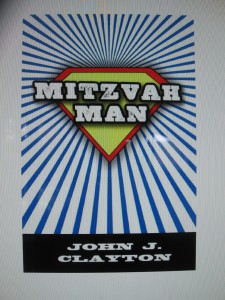 JC: I didn’t know what story I wanted to write. I never do know in advance. I thought about a man recovering from the loss of his wife and knew that his turmoil would be the catalyst for breaking out of his ordinary self. I guess I believe that the ordinary self is a shell, a false self. Casting off that shell, Adam, our Mitzvah Man, grows closer to the true world, which is the world in which God is present. It’s become fashionable, as I said, to suspect any search for depth under surfaces. But it bears repeating. People like to think there are only surfaces. Adam rejects that thinking, rejects the world of pop culture, finds a way to live in God’s world, or anyway at the edge of it.
JC: I didn’t know what story I wanted to write. I never do know in advance. I thought about a man recovering from the loss of his wife and knew that his turmoil would be the catalyst for breaking out of his ordinary self. I guess I believe that the ordinary self is a shell, a false self. Casting off that shell, Adam, our Mitzvah Man, grows closer to the true world, which is the world in which God is present. It’s become fashionable, as I said, to suspect any search for depth under surfaces. But it bears repeating. People like to think there are only surfaces. Adam rejects that thinking, rejects the world of pop culture, finds a way to live in God’s world, or anyway at the edge of it.
BR: A kind of holy ecotone.
JC: The fish is ready. Bluefish has to be absolutely fresh to be worth anything. But if it is, it’s wonderful.
BR: Gorgeous.
JC: Adam, he’s a little nuts but he’s also a superhero. I had a lot of delight in giving him almost-superpowers. Almost. Everything he does can be taken as coincidence or personal will, but I give the reader permission (that I know the reader really wants!) to see him as a prophet, a holy fool, a man held in God’s hands.
BR: It’s very, very satisfying to read, and quite real enough for me to believe in.
JC: But let’s talk over dinner. Fish is ready, potatoes are ready, Sharon’s got the salad all ready. You can open a second bottle of wine.
BR: With pleasure.
JC: “Sharon! Sharon?”
BR: And here she comes.
JC: I’ll drink to that!

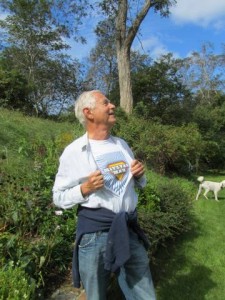
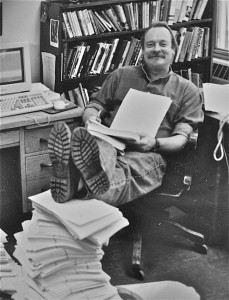
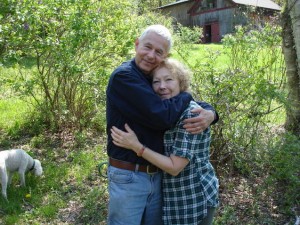
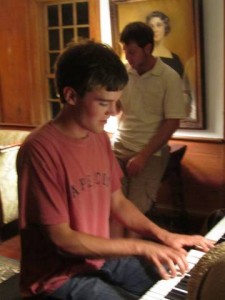

Thanks, Bill. What a great feature and a wonderful interview to start it with. And it’s all in scene!!!!
I love Mr. Clayton’s quest—same as mine, but he says it better. I especially love:
“There’s the unreal world given us by the media, by our culture, by every culture. Then there’s God’s world. I’m not talking about a transcendent being but the core of our true lives—you and your daughter Elysia pulling vegetables from the ground.”
And:
“We pretend to live at the surface of things while our real life is in dreams or a longing for the sacred that’s really true underneath things.”
Some may take this as merely mystical—and while safe, a watery substitute for the religion and received image of God that they wholly reject. But really we don’t yet have the vocabulary and understanding to talk about this, to share it, and to realize that he really is talking about God. What we’ve had, at least in the Judeo-Christian tradition, is metaphors for this human effort at holiness.
People have such a bleak view of their own species. Understandable, given our mistakes and lapses, yet so limited when you consider evolutionary time, how far we’ve come and how far we can and must go. Meantime, we too cheaply ignore our endless quest to soar, shared across the globe. And few question from whence our most human, and greatest, impulses and desires arose. Certain events and documents and behaviors are of evolutionary significance. But what to call that unique inner force that has driven us through the ages?
Thanks, Richard. John has such a warm vision. How to harness it in the battle against greed? I wish I could just call Mitzvah Man!
Congratulations on another great book, John Clayton. I met you at UMass around 1982 in your creative writing class (you had the house with the swing), and everyone in the class was a little in love with you. We chatted briefly at OSU when you won the Sandstone (I finally made it to graduate school a decade a half later). I still have my typed onion-skin stories with your comments in pencil. A long over thank you for being an inspiring teacher and writer.
And congratulations to you Mo, on your new book, Killer Stuff and Tons of Money: Seeking History and Hidden Gems in Flea-Market America. Would love to interview you sometime soon!
I’d be honored. BTW, Nancy Sferra was supposed to bring you a signed copy when you went up north, but she forgot it! (We’ve known each other since my Nature Conservancy days in Michigan, and she lives up the street for me in Maine.) I’ll put a copy in the mail to you. Mo
Wonderful! Just so you know that I’m anything but a superhero. Shazam, m’fucka. Loved the interview and the experience of doing it. Hope to see you soon.
John